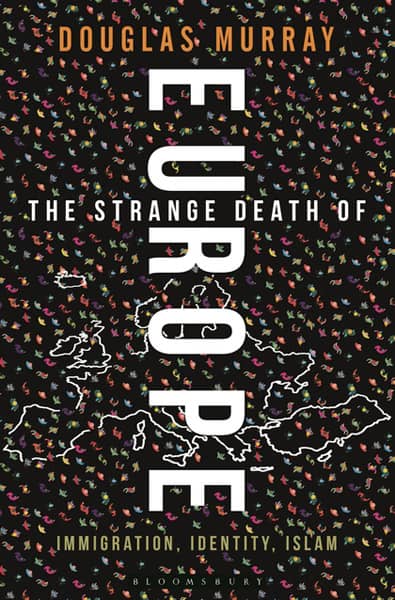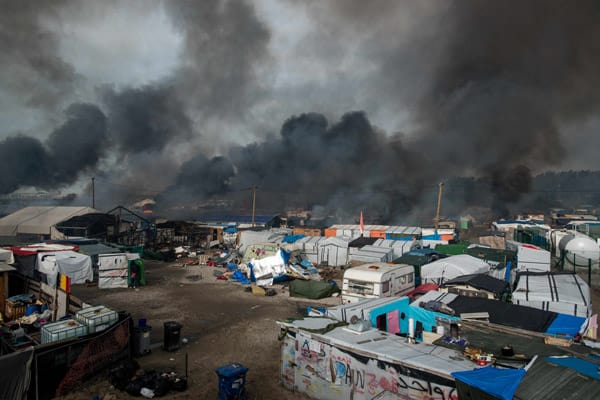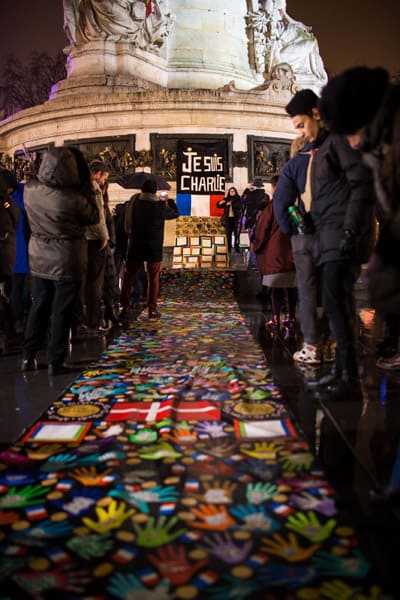The Strange Death of Europe
Jared Taylor, American Renaissance, June 30, 2017
Douglas Murray, The Strange Death of Europe: Immigration, Identity, Islam, Bloomsbury Publishing, 2017, 343 pp., $23.40.
This is an important book. Something remarkable has happened when a prominent British author and associate editor of The Spectator begins a volume with these words: “Europe is committing suicide.” On the first page, Douglas Murray explains that this is suicide by immigration and that “by the end of the lifespans of most people currently alive, Europe will not be Europe and the peoples of Europe will have lost the only place in the world we had to call home.” Few authors express so passionate a love Europe or such a keen sense of what could be lost. Perhaps none has so ably described the lies, cowardice, self-loathing, and lassitude that have set calamity in motion.

At the same time, this is a deeply dissatisfying book. Mr. Murray sees what is at stake: migration is as ruthless as war. And yet he cannot bring himself to recommend decisive action. He makes a few flaccid suggestions, but seems to think oblivion is better than anything that could be called “extremism.” Once or twice, he hints that survival might require distasteful means, but he would never stoop to anything illiberal.
Most of this book describes how Europe’s “leaders” have, decade after decade, betrayed their people. Polls have always shown that ordinary people don’t want mass immigration. When the public gets angry enough, politicians promise to stop it. In 1993, for example, the French minister in charge of immigration, Charles Pasqua, vowed to make France a country of “zero immigration.” Mr. Murray suspects that Mr. Pasqua knew all along his promise was worthless.
In 2010, Angela Merkel of Germany, David Cameron of Britain, Nicolas Sarkozy of France, and former prime ministers John Howard of Australia and Jose Maria Asnar of Spain all declared that multiculturalism had failed. Mr. Murray thinks they were just gulling the voters, and had no intention of cutting immigration.

Chaotic scene of the Jungle in Calais, France on October 26, 2016. (Credit Image: © Guillaume Pinon/NurPhoto via ZUMA Press)
Whenever Europe’s rulers actually try to justify immigration, they shift from one argument to another: They say new blood fuels the economy — even though anyone can see that swarms of foreigners are living on the dole and that the ones who work are depressing wages for natives. When economic arguments fail, bureaucrats shift to moral or cultural ones.
The moral argument is that because of the Crusades, empire, and the slave trade, “Britain [and all of Europe] must be uniquely punished for the deeds of history.” This thinking leads to bands of white Britons flying to West Africa, where they troop through the streets in chains, get on their knees, break into tears, and ask forgiveness for slavery from bemused Africans — whose ancestors were the original slave traders.
Whites love to apologize. All Europeans are assumed to have inherited ancient guilt, but they would scold anyone who said all Mongols are guilty for what Genghis Khan did or that all Africans are responsible for Idi Amin. Turks, for example, never apologize for anything the Ottoman Empire ever did, and attack anyone who says they were unkind to the Armenians.

Holingol, Mongolia, China – Terracotta Mongolian Warriors and a statue of Genghis Khan are seen at recently completed tourist site named Mount Khan. (Credit Image: © Ren Junchuan/Xinhua/ZUMAPRESS.com)
Another justification for mass immigration is to claim it has always been happening. It is now common for the British to claim idiotically that “we are a nation of immigrants” and that “we have always been a melting pot.” The British should look forward to replacement, urged on by what Mr. Murray calls the implicit message of mass immigration: “Get over it. It’s nothing new. You were terrible. Now you are nothing.”
And then there is the excitement of cultural enrichment. When in 2011 it was announced that white Britons had become a minority in 23 of London’s 33 boroughs, it was declared a victory for diversity. Mr. Murray notes that “a sense of excitement and optimism . . . seemed the only tone appropriate to strike.”
The official view is that replacement will be glorious. Mr. Murray writes that the British authorities kept it quiet when Mohammed first became one of the most common names for boys, but now this is proclaimed as progress because “Britain will remain British even when most of the men are called Mohammed . . . .” In fact, in 2015, more British Muslims were fighting for the Islamic State than were in the British military.
Mr. Murray reminds us of an event from nearly 30 years ago that should have been a warning. In 1989, Ayatollah Khomeini issued a fatwa (Islamic death warrant) against the British author Salmon Rushdie for his “blasphemous” portrayal of Mohammed in his novel The Satanic Verses. British Muslims roared into the streets demanding Mr. Rushdie’s head and calling for laws to protect The Prophet. Muslims firebombed stores that sold the book — including several in the United States. There were killings and attempted killings. Mustafa Mahmoud Mazeh blew up several stories of a British hotel with a bomb intended for Mr. Rushdie.
Mr. Murray points out that there were fewer than one million Muslims in Britain in 1989. Now there are close to three million, but this is nothing to worry about since everyone in Britain is an immigrant. When, in 2060, white Britons become a minority it will simply be the march of history.
The British love to excuse Islamic terror. After a thwarted attack in London in 2007, the Labour Home Scretary, Jacqui Smith, said it was wrong to call such acts Islamic terror because the perpetrators were acting contrary to Islam. She said the right term was “anti-Islamic activity.”
In 2013, when Lee Rigby was slaughtered in broad daylight in London, Prime Minister David Cameron said it was “a betrayal of Islam — and of the Muslim communities that give so much to our country.” He also said of other Muslim murderers: “They claim to do this in the name of Islam. That is nonsense. Islam is a religion of peace. They are not Muslims; they are monsters.”
At a more personal level, the British Medical Association estimates that 74,000 women have had their genitals mutilated in the UK — but there has not been a single prosecution for the crime. Reports on rising anti-Semitism dare not say the cause is more Muslims.
The feelings of Muslims must never be hurt. When a Danish magazine published cartoons of Mohammed in 2005 it caused rioting throughout Europe and the Islamic world. Seventy-eight percent of British Muslims thought the publisher should be prosecuted. Most European elites criticized the publication, not the rioters. In 2006, when a Norwegian newspaper reprinted the cartoons, Prime Minister Jens Stoltenerg threatened the editor with prosecution.
Coddling can go only so far. Mr. Murray notes that even those who said that the editors of the French magazine Charlie Hebdo — which had mocked Islam — might have provoked the murder of its editors were hard pressed to explain why, 18 months later, a priest saying mass in a small church in Rouen deserved to have his throat slit.

January 7, 2017: Charlie Hebdo tribute marks two years of Islamist attacks on France. (Credit Image: © Maxppp via ZUMA Press)
Mr. Murray notes that many Europeans — Swedes, especially — “respond to mass immigration by pretending either that the country of arrival does not have a culture, or that its culture and identity are so especially weak, worn out or bad that if they did disappear they could hardly be mourned.”
In 2004, Swedish Minister of Integration Mona Sahlin told an audience of Kurds that Swedes were envious of them because they have a culture, whereas Swedes have only a few silly things like the festival of Midsummer’s Night. In 2005, journalists asked Sweden’s lead official for migrant integration, Lise Bergh, whether Swedish culture was worth preserving: “Well, what is Swedish culture?” she replied. “And with that I guess I’ve answered the question.” In 2006, Swedish Prime Minister Fredrik Reinfeldt said “only barbarism is genuinely Swedish. All further development has been brought from outside.” In 2015, he also said that Swedes are “uninteresting,” that borders are “fictional,” and that Sweden belongs to people who come looking for a better life, not to Swedes. In 2015, Ingrid Lomfors of Sweden’s Living History Forum insisted that all Swedes are immigrants, and there is no such thing as Swedish culture.
Sweden is now getting large doses of culture. In 2015, the direct costs of migrants (50.4 billion kroner or 5.8 billion USD) were greater than the Swedish defense budget (48 billion kroner or 5.5 billion USD).
Swedes are determined to like their new country. In 1993, when the Swedish paper Expressen reported a poll that found 63 percent of Swedes wanted immigrants to go back home, the paper’s owners fired the editor. But in the wake of the huge, 2015 influx of “refugees,” even Sweden said it would start checking papers at the borders. When Deputy Prime Minister Asa Romsen made this announcement, she broke down in tears. The next year, the president of the European Commission, Jean-Claude Juncker, was still claiming that “borders are the worst invention ever made by politicians.”
Mr. Murray covers the 2015 crisis in great detail, noting how Angela Merkel won world-wide praise by urging everyone to come. It will be “a gain for all of us,” she claimed, and warned that anyone who disagreed had “prejudice, coldness, or hatred” in his heart. The Economist was typical of European media, calling Chancellor Merkel “brave, decisive, and right.” Some German cities welcomed the new arrivals as if they were a champion sports team coming home from a match.
In 2010, when the Chancellor claimed multiculturalism had failed, Germany got 50,000 asylum seekers. One million in a single year would surely make it a success. Saudi Arabia kindly offered to pay for 200 new mosques in Germany for the migrants.
Mr. Murray details the extraordinary steps the police, press, and governments took to cover up crimes — especially sex crimes — by the new wave of immigrants. Everywhere in Europe, the apparent fascination and contempt brown-skinned people felt for white women was too terrible to acknowledge, and facts that might lend credence to “racists” had to be suppressed.
Everywhere, the reaction has been not to clamp down on the problem — immigration — but to clamp down on resistance to immigration. German police grill people who writes rude things about Muslims on Facebook. Officials in Bavaria warn women that wearing short skirts could lead to “misunderstandings.” At one point, British plainclothesmen were sent for meals in curry houses to listen for patrons who might unbosom forbidden thoughts. People associated with “far-right” parties lose jobs. Mr. Murray notes that it is always easier to criticize white people than brown people, and that criticizing white people provides a thrill of moral superiority.
Brown people are feeling the thrill. In 2016, in Mannheim, Germany, three immigrants raped a half-Turkish spokesman for a left-wing youth movement. She claimed her attackers were Germans. When the truth came out, she wrote a letter of apology to the rapists, saying, “I will not stand by idly and watch as racists . . . call you a problem.” That same year, the German publication Der Freitag and Huffington Post Germany posted an article by an 18-year-old Syrian migrant who said his people were “fed up” with hostile Germans. “You can, and I think you should, leave Germany,” he wrote. “Germany does not suit you, why do you live here? . . . Look for a new home.”
It has now become clear that no government in Europe is capable of anything but token deportations of only the worst criminals among failed asylum seekers. When officials in Germany noted that 750,000 people of the million or so who came in 2015 were probably not true refugees, everyone knew there was no chance they would be sent home. Every young man in every failed Third-World country knows that once he breaks into Europe he can stay. George Soros’s Open Society Foundations have distributed millions of leaflets explaining how to pretend to be an asylum seeker.
Mr. Murray understands where this is leading: to the death of Europe. There may be bits of it left in the countryside or in very wealthy enclaves but “the less well off will have to accept that they do not live in a place that is their home but is one that is a home for the world.”
Why is this happening? Mr. Murray believes that as Christianity faded, Europeans lost faith in themselves. He also thinks they let immigration reach such a level that it could not be thought of as a bad thing. Even if it became clear that every single newcomer hated Europeans and wanted to kill them, Europe’s leaders would never accept that, because it would mean they had to do something about it. Every succeeding act of terror therefore is met with solemn declarations that this is “intolerable,” — but not a single measure to keep out the people who commit terror.
Mr. Murray thinks dispossession was possible because it was carried out by stealth:
Had the leaders of Western Europe told their publics in the 1950s or at any point since then that the aim of migration was to fundamentally alter the concept of Europe and make it a home for the world, then the people of Europe would most likely have risen up and overthrown those governments.
Wrong. In 2009, a former Labour speech writer, Andrew Neather, admitted that Tony Blair’s government had deliberately let in waves of non-whites so as to “rub the Right’s nose in diversity” and create an electorate that would vote Labour. There was barely a ripple of indignation. Sweden’s rulers have repeatedly told their own people they deserved to be replaced; there has been no revolution. Europeans don’t have the stomach for it.
Mr. Murray also thinks that after having lived through the failures of both fascism and communism, Europeans have nothing left in which to believe:
We have become deeply “suspicious” of all truths. The fact that all of our utopias failed so terribly did not only destroy our faith in them. It destroyed our faith in any and all ideologies. . . . If there remains any remaining certainty it is a distrust of certainty.
Wrong again. Europeans — including Mr. Murray — are certain that “racism” is a great and abiding evil, and that no solution to the immigration problem should ever align with “political extremism,” whatever that is.
The great irony in Mr. Murray’s lament for Europe is that there are many people who saw impending tragedy long before he did and have devoted their lives to fighting it. And Mr. Murray doesn’t like them. His only mention of the British National Party is to call it “the country’s only racist political party” and to note happily that it has been crushed at the polls. He does concede that such parties as the Vlaams Belang, the French National Front, and the Swedish Democrats have taken great pains to purge “Nazis,” and concedes that “it will be necessary to broaden the political consensus and to accept thoughtful and clearly non-fascist parties once described as ‘far right’ at the political table.” Still, he laments that many of their members hold “rancid political views,” and should be further purged.

Marine Le Pen rally. (Credit Image: © Maxppp via ZUMA Press)
Mr. Murray also writes about such people as Pim Fortuyn, Ayaan Hirsi Ali, Theo van Gogh, Oriana Fallaci, and Tommy Robinson without malice but without admiration, either. More to the point, he never says that such people are right. If they are not right, who is? “As recent elections in Austria and the rise of Alternative für Deutschland seem to prove,” he writes, “the options for cultural defense continue to be unacceptable.” Why are they unacceptable?
Of the economic migrants who are pushing into Europe, Mr. Murray writes, “Most of us do not want to eject most or many of them . . . .” He is aware of “send-them-back rhetoric” but calls it “ugly.” Is Mr. Murray content to be a passive chronicler of decline, or does he care enough to try to save Europe? He tells us Europeans should be encouraged to have more children. He says that if we paid North African countries enough they might set up migrant processing centers where true refugees could be sorted out and sent on to Europe. He writes that it would be desirable to organize a Europe-wide program to deport failed asylum seekers.
Europe is fighting for its very life. Dare it not shed a single drop of blood in order to live? Dare it not flirt with “political extremism” if that is what it takes to survive? Dare it not weave a circle around itself and declare, “Our ancestors build this for us — not for you — and we will keep it for our descendants forever”?
Occasionally, Mr. Murray hints that Europe might — someday — take off the gloves: “[I]t is not inevitable that Europeans will forever be persuaded of our historical and hereditary iniquity, so it is possible that we might eventually say that racial politics cannot be for everyone else but not for us.” But those of us who say this now are “rancid.” Likewise, “Is it possible that at some point there will come a moment when young people who have done nothing wrong themselves say “enough” with this guilt?” There are already such people, and they are called “Identitarians,” but Mr. Murray passes over them in silence.
Mr. Murray’s analysis is also surprisingly parochial. He writes of European capitulation as if it were unique: Politics as usual “will continue to ensure that Europe is the only place in the world that belongs to the world.” Does he not see that the United States, Canada, Australia, and New Zealand face exactly the same threat and for exactly the same reasons? Virtually all whites are denatured. Mr. Murray notes that Eastern European countries refuse to take in “refugees,” but is too skittish to say they should be our inspiration.
But perhaps I am too critical of an author who must live and publish in a world gone mad. It is a great service just to point out that for Europe to “celebrate diversity” is to commit suicide. But if Europe is to live, it must produce braver men than Douglas Murray.















